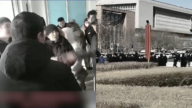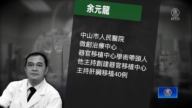【新唐人2014年04月24日讯】5万名工人罢工持续两周之后,号称全球最大的品牌鞋类生产商——广东东莞裕元鞋厂,最后不得不做出让步,增加工人的福利待遇。据统计,今年年初以来,中国国内出现罢工次数比去年同期多出三分之一。中国工人开始懂得维护自己的权利,和提出正当诉求了吗﹖请看报导。
“裕元鞋厂”作为世界名牌运动鞋的代工基地,在中国拥有多个厂区。“裕元”所属的台湾“宝成集团”,在中国的工人超过16万,是全球60多个品牌的代工厂,约占全球运动鞋及休闲鞋市场20%的份额。
但“裕元”在员工的社保金缴纳上却违反规定,只按“临时工”标准给正式员工缴纳社保金,或者干脆逃避企业应该缴纳的部分。
2007年,此事曾被《央视焦点访谈》节目曝光。
但十年来,“裕元”依然不改。
今年4月5号,工人停工堵路,要求工厂补缴社保基金。“裕元”厂方声称将在14号给出答复。但14号厂方再次回避问题。
当天,愤怒的工人拉起横幅,有超过5万名工人走上街头。工人与警方还发生了冲突,有工人受伤。
随着罢工事件的持续,“宝成集团”最后做出让步,并在21号宣布,自5月1号起,将社保及住房公积金足额缴纳,一次到位,并同意根据员工个人意愿,补缴养老保险及住房公积金。
“宝成”同时也宣布,自5月起,东莞厂区每人每月加发人民币230元生活津贴。
纽约“中国劳工观察”创办人李强:“东莞裕元鞋厂,它解决这个纠纷的时候,主要是它资方董事会做一个决定,实际上根本没有充分征求工人的意见。虽然它在21号出台了一些政策,比如对经济上的一些让步。但是从尊重工人来讲,我觉得还是没有做够的。”
总部设在纽约的“中国劳工观察”组织创办人李强表示,在中国没有尊重工人的企业文化,如果工厂有一个通过民主选举的工会帮工人维权,情况就不一样了。但中国缺少这样的制度,没有给劳资双方提供沟通平台。
像“裕元鞋业”这种因待遇问题发生的罢工,并不是个案:
今年3月6号,美国国际商用机器公司“IBM”深圳工厂,一千多名员工罢工﹔3月24号,上海市嘉定区的日本独资企业“上海内野有限公司”,700多名工人罢工﹔4月10号,上海“三星广电电子器件有限公司”一千多工人罢工;21号北京市“电机总厂”上千名员工罢工﹔美国的跨国零售企业“沃尔玛”也正在与工会进行谈判。
设在香港的《中国劳工通讯》统计,3月份发生了119起罢工事件。《中国劳工通讯》指出,在中国,今年罢工事件的总数增多了近三分之一,创下自全球金融危机以来的最大增幅。
《中国劳工通讯》的发言人郭展睿认为,中国工人开始懂得自己维权了,也敢于对老板说“不”了。
香港《中国劳工通讯》发言人郭展睿:“他们现在有办法,他们有自己的权利,他们都知道他们的权力在哪里:他们可以罢工、抗议这样的行动。”
“贝克•麦肯思国际律师事务所”驻香港的“中国就业和劳工问题特别律师”乔纳森•萨克斯表示,“如果没有强制性仲裁或罢工,工人很难表达出自己的诉求。”
但中国《集体谈判论坛》网站的编辑何远端认为,参与集体谈判的工人会面临被解雇的下场。
事实上,由于中国的法律缺乏对“罢工”权利的保护,工人在雇主“解聘”和“惩罚”面前束手无力。一旦工人走出工厂在街头抗议的话,那么就会面临被“维稳”。
郭展睿认为,如果还是没有能代表工人利益的“工会”的话,工人的利益得到保证肯定是空话。
很多研究中国经济发展过程的学者认为,中国劳动力成本低廉的一个重要因素,就是压低了工人的福利成本,也就是对工人权益的侵食。
采访/朱智善 编辑/宋凤 后制/郭敬
Chinese Workers Strikes Increasing; Global Brand Factory Facing Problems
Yue Yuen Shoe Factory in Dongguan, Guangdong
Province, is one of the world’s largest shoemakers.
For two weeks, about 50,000 of
it’s workers have been on strike.
Due to these protests, the company had to make
concessions to increase workers’ welfare payments.
Sources say that since the beginning
of 2014, there has been a year-on-year increase in the number of workers striking.
Have Chinese employees come to know more
about their rights and embrace legal actions?
Let’s take a look at our report.
Yue Yuen Shoe Factory is an international brand
sports footwear maker, and has several plants in China.
Yue Yuen belongs to Baocheng Group in Taiwan.
It has more than 160,000 employees in China,
producing over 60 international brands.
This encompasses 20% of the sports
footwear and casual shoe market globally.
Employees social security benefits
in Yue Yuen are processed illegally.
The company only pays permanent workers
benefits as if they are temporary employees.
Sometimes, the company completely
fails to make any payment.
In 2007, this issue was reported
by China’s state-run television.
Over the past ten years, the situation
in Yue Yuen has remained unchanged.
On April 5, staff stopped working
and blockaded the entry road.
They requested the company to
recompense their social security benefits.
The company said that they will reply on April 14.
However, the company has not yet responded.
Angry workers therefore resorted to holding banners,
and approximately 50,000 demonstrating on the street.
Police and protesters clashed,
and some workers were injured.
The strikes continued, and the Baocheng
Group finally made concessions.
On April 21, the company announced that from
May 1, workers’ social security benefits and
housing allowances will be paid in full on time.
They also agreed that according to workers’ requests,
they will recompense pensions and housing allowance.
Baocheng Group also said that from May 1,
each workers monthly pay in the Dongguan
factories will increase by 230 yuan (US$37).
Li Qiang, founder of New York-based China Labor Watch:
“When Yue Yuen shoe factories resolved this dispute,
it is their board members that made this decision.
Actually, they didn’t seek any opinions from their workers.
Although they have issued policies on April 21 to
make financial concessions, from the point of view
of respecting workers, I think it is still not enough.”
Li Qiang says that in China, there is no
business culture of respecting employees.
If there was an elected labor union to help
the staff, the situation will not be the same.
However, China lacks this union system,
and there is no platform for negotiation
between the employers and employees.
Yue Yuen workers’ striking over
welfare payments is not an isolated case.
On March 6, about 1,000 staff in
IBM Shenzhen factory went on strike.
On March 24, 700 workers of a Japanese company
in China, Shanghai Uchino, went on strike.
On April 10, over 1,000 workers at
Shanghai Samsung SDI went on strike.
On April 21, over a thousand of workers at
Beijing Electric Motor factory went on strike.
In addition, US retail company Wal-mart in
China is currently negotiating with a labor union.
Bulletin,119 workers strikes took place in March.
It considers that in China, labor disputes
have increased by nearly a third this year.
This has been the biggest surge in
protests since the global financial crisis.
Guo Zhanrong, spokesperson of
China Labor Bulletin commented.
Chinese workers are gradually coming to know
their rights, and dare to say “No” to their boss.
Guo Zhanrong: “Now workers have their
way to deal with it, they have their rights.
They know more about their rights and they can take
action, including going on strike and staging protests.”
Jonathan Isaacs is a Special Counsel, for
Chinese employment and labor issues, at
Baker & McKenzie law firm in Hong Kong.
Mr Isaacs says that, “it’s hard for workers to really press
their demands without mandatory arbitration or a strike.”
He Yuanrui is editor for jttp.cn, a negotiation forum website.
He says that workers who participate
in negotiations could face dismissal.
Chinese laws lack protection for the rights
of strikers, and protesters feel helpless when
they are sacked or punished by employers.
In addition, as soon as workers stage a protest on the
street, they will face police force in “maintaining stability”.
Guo believes that without labor unions representing
worker’s interests, those interests are just empty talk.
Scholars of China’s economic development process
suggest that an important factor for cheap labor
in China is that the cost of workers’ welfare is low,
This violates labor’s rights.
Interview/Zhu Zhishan Edit/SongFeng Post-Production/GuoJing



























